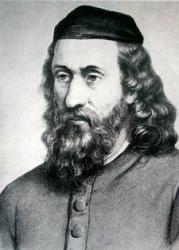
1487 - 1547 Person Name: Johann Roh Author of "Freuet euch allegleich" Pseudonyms--
Johann Cornu
Johann Horn
John Horn
Roh, Johann, was a native of Domascbitz near Leitmeritz, in Bohemia. Roh was his name in Bohemian, but when he wrote in Latin he styled himself Cornu, and in German Horn. In 1518 he was ordained priest and appointed preacher to the Bohemian Brethren's community at Jungbunzlau, in Bohemia. At the Synod of Brandeis, in Sep. 1529, he was chosen as one of the three Seniors of the Unity. Finally, at the Synod of Brandeis, in April 1532, he was appointed Bishop, and held this post till his death, at Jungbunzlau, Feb. 11, 1547. (Koch, ii. 114; Wackernagel, i. p. 727, &c.)
Roh was the editor of the Bohemian Hymn Book of 1541, and is said to have written a number of hymns in the Bohemian language, but the edition of 1561 only gives one with his name. He also edited the second German hymn-book of the Brethren, viz., Ein Gesangbuch der Brüder inn Behemen und Merherrn, Nürnberg, 1544; and seems to have been author or translator of all, or nearly all, of the 32 hymns there added. Another hymn ("O heiliger Vater, glitiger Herr") is also given with his name in the Kirchengeseng, 1566. A considerable number of Ron's hymns passed into the Lutheran hymn-books of the 16th and 17th centuries, and into the Moravian Hymn Books of the 18th cent. Rather curiously in the last Moravian Hymn Books, (the Kleines Gesangbuch, Gnadau, 1870), his name is not found in the list of authors.
Those of Roh's hymns which have been translated into English are:—
i. Gottes Sohn ist kommen. Christmas. In 1544, as above, and thence in Wackernagel iii. p, 350, in 9 stanzas of 6 lines, The heading "Ave Hierarchia" refers to the melody, for it is not a translation from the Latin. Included in V. Babst's Gesang-Buch, Leipzig, 1553, and recently in the Unverfälschter Liedersegen, 1851, No. 6, Strangely enough this fine hymn was omitted from the Kirchengeseng of 1566 and later editions; and though it was included in the Herrnhut Gesang-Buch, 1735, and the Brüder Gesang-Buch, 1778, it has again been omitted from the Kleines Gesang-Buch, 1870. The translations are:—
1. Lo! from highest heaven. A free translation of stanzas i.-iii., vi., by A. T. Russell, as No. 27 in his Psalms & Hymns, 1851. Included, altered, in Kennedy, 1863.
2. Once He came in blessing. A good translation of stanzas i.-iii., v., ix., by Miss Winkworth, in her Chorale Book for England, 1863, No. 26. Included in J. Robinson's Collection, 1869, and the Pennsylvania Lutheran Church Book, 1868.
3. God's Son once descending. This is No. 249 in pt. i. of the Moravian Hymn Book, 1754.
Hymns not in English common use:—
ii. Betrachtn wir heut zu dieser Frist. Easter. 1544 as above, and in Wackernagel, iii. p. 359, in 14 stanzas of 3 lines. Translated as:—(1) "The Saviour Jesus, Friend of Man." As No. 332 in pt. i. of the Moravian Hymn Book, 1754. This is from the recast "Der selge Heiland, Jesus Christ" (based on ii.-v.), as No. 1875 in Appendix xii. c. 1745, to the Herrnhut Gesang-Buch 1735.
iii. Ein starker Held ist uns kommen. Christmas. 1544 as above, and in Wackernagel, iii. p. 352, in 12 stanzas of 4 lines. Translated as (1) "God took our nature upon Him (stanza iii.), as No. 251 in pt. i. of the Moravian Hymn Book, 1754.
iv. Lob Gott getrost mit singen. Christian Church. 1544 as above, and in Wackernagel, iii. p. 360, in 9 stanzas of 8 lines. In the Kirchengeseng, 1566, two st. were inserted between iii. and iv. This form, in 11 stanzas, is No. 563 in the Unverfälschter Liedersegen 1851. In the Brüder Gesang-Buch 1778, No. 1014, is a cento in 3 st. (from st. vi., viii., ix. of the 1544, and iv. of the 1566), beginning "Lass dich durch nichts erschrecken," and this form has been translated as "O be not thou dismayed, Believing little band," as No. 596 in the Moravian Hymn Book, 1886.
v. O Mensch, thu heut hören. Passiontide. 1544 as above, and in Wackernagel, iii., p. 355, in 20 stanzas of 4 lines. The English version is "I am thy Lord and God" (st. ii.), as No. 258, in pt. i. of the Moravian Hymn Book, 1754. [Rev. James Mearns, M.A.]
--John Julian, Dictionary of Hymnology (1907)
Jan Roh


 My Starred Hymns
My Starred Hymns



